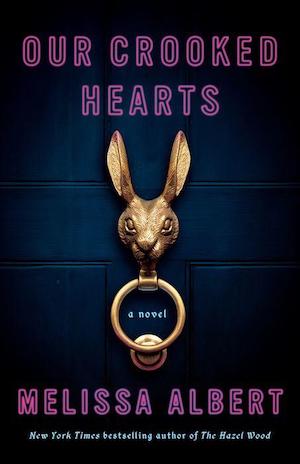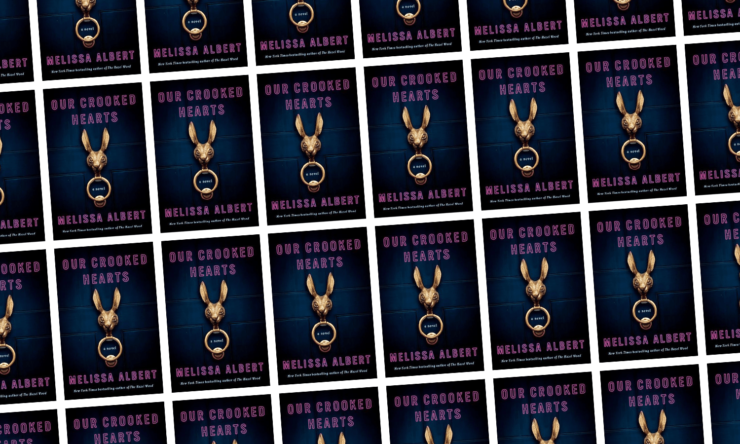With Our Crooked Hearts, Melissa Albert returns to mine the rich vein of fraught familial relationships she tapped in The Hazel Wood series. From secretive mothers and destructive daughters to wild magic and bloodthirsty antagonists, this new novel has everything I loved from Albert’s earlier series and then some.
Albert unspools her story through multiple points of view. We follow through the first person POVs of Ivy and Dana as 17-year-olds discovering magic and third person POV peering over Marion’s shoulder. The bulk of the story is split between Dana and Ivy. Way back when, Dana was a latchkey kid with little direction and few dreams. She and her best friend Fee thought they were the only ones who could do things, until Marion dropped into their lives. Marion was a rich girl from the other side of town with too much time on her hands, a girl who carefully crafted her world, her relationships, and her appearance. In her possession was a grimoire from a dead practitioner, and the three teens began dabbling in power they could barely comprehend. When a spell went bad and evil grabbed a foothold in the world, the trio was ripped apart by a reckless decision.
Buy the Book


Our Crooked Hearts
Today, Ivy has a fractured relationship with her mother, Dana. Ivy’s father seems constantly on the verge of demanding a divorce and her brother Hank reappears only long enough to pick at Ivy like a scab. With her mother, Ivy gets the sense that she sees her daughter as a lifetime’s worth of regrets stuffed into a smaller version of her. When she and her soon-to-be ex boyfriend almost run over a mysterious and naked teenage girl, Ivy’s rocky life is upended. The consequences of Dana’s choices years ago come home to roost.
There’s a lot to like in Our Crooked Hearts. Energetic and moody, it has the tone of an old school fairytale—the kind with sharp teeth and dripping blood—come to life. The flowery prose will probably be a Your Mileage May Vary situation; in my case it didn’t always click. Most of the time it felt atmospheric and lyrical, yet sometimes it veered into being overwrought. It makes the story rise above its well-worn premise, but that also means most of the most interesting and creative elements are not in the story itself but in the sentences. I sometimes struggle with understanding metaphors, and this book is chock full of them. Yet I was able to glide past the ones I couldn’t process and still sink into the story.
“It was one of those raw, unjust spring afternoons when the air is so bright and clean it focuses the whole world like a lens, but it’s still cold and still and you’re shivering. Just a half-hour trip, then we stepped off the bus like we’d landed in Oz. All the lawns were fat green pincushions, all the faces well fed. The sun sliced through the clouds in tempered golden bars, like even the light got expensive when you left the city…she led us through the streets of the cushy college town, past houses perched like sailboats on grassy swells…Fee and I looked at each other behind her back. It was sharp as a box cutter, that look.”
Two elements in particular came off as underdeveloped. There are only two boys close to Ivy’s age in the book, a bad boy and a nice guy, and as per cishet YA tradition, Ivy has romances with both. The relationships are shallow, one intentionally so and the other unintentionally. Insta-love stories only really work if there is a real foundation underneath that attraction. Albert attempts to do this by giving two of the teens a childhood history together, but there is little depth or meaning beyond that. This is one of those situations where I wish the romance had remained platonic. I would’ve also liked to see more done with Hank being gay and Fee being Latina. Not that identities always need to be plot points, but those characters are so paper thin that their identities feel almost like tokens rather than a central part of how they move through the world.
What makes this novel really worth reading is the way the women connect with magic. Magic here is an untameable force; it can be temporarily channeled, but not contained or kept. It has rules that you cannot always anticipate and reactions you cannot always recover from. If magic is a force of nature, spell-casting is attempting to direct a hurricane. Each woman has her own interpretations of and interactions with magic. To Fee, magic is a tool to help those in need and a weapon to keep the wicked at bay. To Ivy, it is a thrilling adventure, an act of discovery and growth. To Dana it is a fearsome thing that takes more than it gives and leaves wreckage in its wake. To Astrid it is the act of becoming a god and of reshaping reality to your will. To Sharon, it is nothing but a hassle, a thing that costs too much for what it offers. To Marion, it is power, control, and selfish desire.
The Craft is a common if overused comp title for young adult fantasies about teen girls experimenting with witchcraft. However, in this case, it’s an apt one. This wasn’t as haunting and frightening as I expected, but it was still engrossing and entertaining. Ivy and Dana aren’t the kind of characters you root for but you nevertheless hope they come out victorious. The story is a gust of cold wind on a hot summer’s day. If you loved Ninth House by Leigh Bardugo, A Lesson in Vengeance by Victoria Lee, or When We Were Magic by Sarah Gailey, Our Crooked Hearts by Melissa Albert is definitely worth checking out.
Our Crooked Hearts is published by Flatiron Books.
Alex Brown is a Hugo-nominated and Ignyte award-winning critic who writes about speculative fiction, librarianship, and Black history. Find them on twitter (@QueenOfRats), instagram (@bookjockeyalex), and their blog (bookjockeyalex.com).










